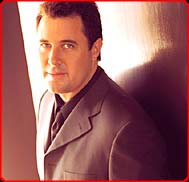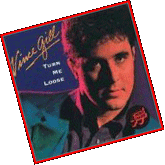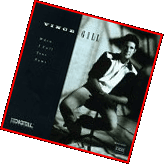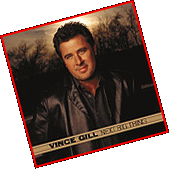
|
||
| Volume II, Issue I | Spring 2003 | |
| Spring 2003 Home Page |
| Culture, Politics & Technology |
| Fiction |
| Music |
| Poetry |
| Theater / Drama |
| About / Contact |
| Archive |
| Current Home Page |

Vince Gill is still the Next Big Thing
 I never met a Vince Gill record I didn't like. No one's music strikes a deeper, more resonant chord in my ears and heart. Now, while some of you may feel this fact may disqualify me from objectively discussing the country music veteran's work, well, that's just tough, folks, because I'm going to do it anyway. So read on at your own discretion and, if you're not a Vince Gill fan, about now you might want to consider clicking on one of Jim Trageser's blues reviews.
I never met a Vince Gill record I didn't like. No one's music strikes a deeper, more resonant chord in my ears and heart. Now, while some of you may feel this fact may disqualify me from objectively discussing the country music veteran's work, well, that's just tough, folks, because I'm going to do it anyway. So read on at your own discretion and, if you're not a Vince Gill fan, about now you might want to consider clicking on one of Jim Trageser's blues reviews.
A triple threat – writer, singer, guitarist – Vince Gill is a bit of a paradox in modern Nashville. Possessing an unparalleled ability to jump musical styles without missing a beat or sounding like a sellout, Gill is one of country music's unfailing champions of bluegrass and traditional acoustic music who also happens to be a kick-ass lead guitar player with a strong '70s-rock sensibility. But he's clearly most content living within three country walls: Gill is the modern master of the painfully sad, 3/4 country-pop waltz.
Gill, 45, has won just about every award there is to win in the music business (Grammies, CMAs, AMAs, etc.), but he remains a gentle soul and, from all accounts, a class-act and a decent human being. And his music reflects the man. Gill – who grew up in Oklahoma where his father, an appellate judge, taught him to play the guitar at an early age – performed with local bluegrass groups as a kid, including the Bluegrass Alliance, Mountain Smoke and Boone Creek with future country star Ricky Skaggs.
Almost as soon as he blew out the candles on his 18th birthday, Gill took his guitar and headed for Kentucky in pursuit of a career in the music business. Within a year, the Okie had made his way from the bluegrass state to California, where eventually he hooked up venerable country-pop outfit Pure Prarie League as lead singer after Craig Fuller ("Amie") had left. With PPP, Gill had his first chart success with the crossover smash singing "Let me Love You Tonight."
 After he left the band, Gill briefly joined up with Rodney Crowell before moving to Nashville, where he signed a solo contract with RCA Records in 1983. His first album, "Turn Me Loose," earned him the Academy of Country Music's Top New Male Vocalist award, but his subsequent releases on RCA achieved only moderate success. Gill became better known during this time as a skilled session guitarist, playing with Reba McEntire, Emmylou Harris, Rosanne Cash, Bonnie Raitt and others.
After he left the band, Gill briefly joined up with Rodney Crowell before moving to Nashville, where he signed a solo contract with RCA Records in 1983. His first album, "Turn Me Loose," earned him the Academy of Country Music's Top New Male Vocalist award, but his subsequent releases on RCA achieved only moderate success. Gill became better known during this time as a skilled session guitarist, playing with Reba McEntire, Emmylou Harris, Rosanne Cash, Bonnie Raitt and others.
 But in 1989, Gill's solo career exploded when he switched labels to MCA and released the traditional country album "When I Call Your Name." The album went double platinum, and the title track, one of the best songs ever to reach country radio, earned Gill a 1990 Grammy for Best Country Song, though it should have won best song period. Since that time, Gill has won 14 Grammies and remains the only person ever to win the Country Music Association Best Male Vocalist award five times in a row.
But in 1989, Gill's solo career exploded when he switched labels to MCA and released the traditional country album "When I Call Your Name." The album went double platinum, and the title track, one of the best songs ever to reach country radio, earned Gill a 1990 Grammy for Best Country Song, though it should have won best song period. Since that time, Gill has won 14 Grammies and remains the only person ever to win the Country Music Association Best Male Vocalist award five times in a row.
Gill has achieved the kind of success most artists only dream about. But he wears his stardom well. While he has an undeniably innate commercial sensibility, everything he does has a sincere ring. His music has always effectively straddled musical genres without feeling a bit compromised. He's never lost his connection and devotion to traditional acoustic music, either, but he's also remarkably adept at writing beautiful pop-rock melodies whose influences range from the Beatles to the Eagles, and at playing smoking electric guitar licks that sound more like Joe Walsh than Bill Monroe. And there's nothing wrong with that, purists.
 His newest release, "Next Big Thing," is his most diverse and, to me, his best work yet. Taking the producing reigns for the first time, Gill draws from a wonderfully broad palette on this record, and the results are poetic and abundantly listenable. "Next Big Thing," which with its 17 tunes goes thankfully against the common music-biz "wisdom" that stars aren't supposed to put more than 12 songs or so on a CD, works not in spite of, but because of the fact that Gill produced this project himself. It's both an intensely personal and positively commercial piece of work, and that's a rare and welcome combination.
His newest release, "Next Big Thing," is his most diverse and, to me, his best work yet. Taking the producing reigns for the first time, Gill draws from a wonderfully broad palette on this record, and the results are poetic and abundantly listenable. "Next Big Thing," which with its 17 tunes goes thankfully against the common music-biz "wisdom" that stars aren't supposed to put more than 12 songs or so on a CD, works not in spite of, but because of the fact that Gill produced this project himself. It's both an intensely personal and positively commercial piece of work, and that's a rare and welcome combination.
Gill gives us a little bit of everything here, from rockabilly-pop (the opening title track) to the stunningly pensive "These Broken Hearts," which he co-wrote with Pete Wasner and sings with Michael McDonald. Gill's tenor and McDonald's baritone on ballad about the end of a relationship works so well it almost defies description. This song, particularly the line, "There's a sadness in the wind," will stay with you long after it ends.
Vince also offers an earnest, whiskey-soaked tribute to country legend Merle Haggard ("Real Mean Bottle"), a rousing traditional number ("This Old Fiddle"), and a slightly and rightly cynical take on modern Nashville star-making ("Young Man's Town"). But the best two songs on this record showcase's Gill's mastery at writing and singing a simple story song that goes straight for the emotional jugular: "Whippoorwill River" and "This Old Guitar And Me."
"Whippoorwill River" is another of Gill's trademark waltzes, this one telling the three-generational story of a man, the man's father, and the man's son and how they all like to go down to the river to fish and discuss life and its simple pleasures. A hauntingly beautiful observance of family and the poignant connection between the past, present and future, this song made me cry when I first heard it, and still does. And the gentle acoustic guitar/fiddle/piano vamp at the end is one of the most lovely pieces of music you'll ever hear.
"My Old Guitar and Me," a sentimental chronicle of a man and his acoustic guitar through an entire life, is vintage Gill, with a bit of that '70s storyteller feel in the tradition of Jerry Jeff Walker and Kris Krostofferson. Thinking about how I can best describe this song to you makes me realize that, sometimes, writing about music is futile and silly. You just have to listen to the music to really understand. Buty I will say that, more than just about any song that I can recall of Gill's, this one is a deeply heartfelt celebration of the music life, and of music itself.
And so is this entire record and, for that matter, Gill's entire career.
![]()
Spring 2003 Music Section | Spring 2003 Main Page
Current Music Section | Current Home Page
Copyright ©
Reprinted by permission of author, who retains all copyright and control.